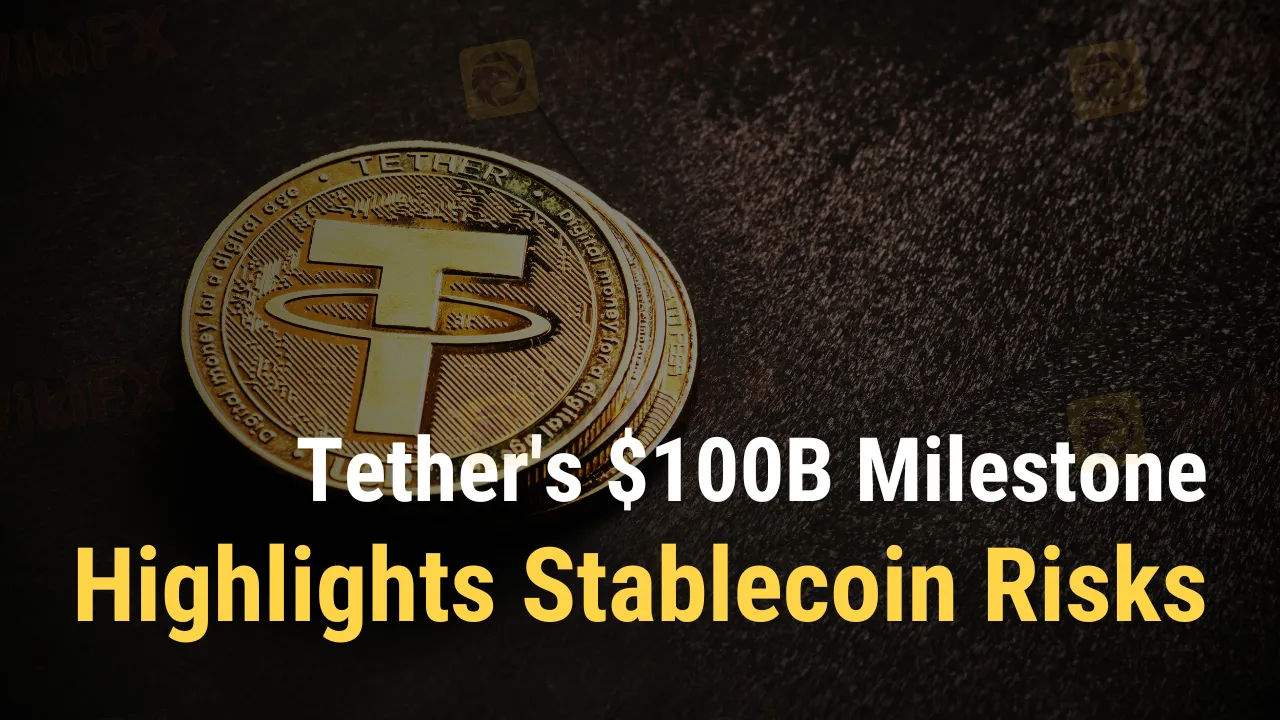简体中文
繁體中文
English
Pусский
日本語
ภาษาไทย
Tiếng Việt
Bahasa Indonesia
Español
हिन्दी
Filippiiniläinen
Français
Deutsch
Português
Türkçe
한국어
العربية
Tether's $100B Milestone Highlights Stablecoin Risks
Abstract:Tether reaches $100 billion, sparking stability concerns in the financial market. This largest stablecoin links to conventional currency, aiding swift crypto transfers.

Tether, the biggest stablecoin, reached $100 billion this week. This astonishing achievement raises worries about digital money's financial market risks. Tether is a stablecoin connected to a conventional currency. Tether says it backs each cryptocurrency with dollar-denominated assets for stability. Crypto traders use Tether to transfer money between trading platforms quickly and without utilizing the banking system.
Michael Hall, a founding partner of Nickel Digital, a crypto asset management company located in London, attributes Tether's smooth money transfers across trading platforms to the company's day-to-day operations. Stablecoins are helpful in the cryptocurrency market, but authorities worry about their financial system vulnerabilities. They see these digital currencies as a link between crypto and conventional finance, putting the latter in danger.
Tether's dominance poses a systemic danger, says CoinShares Head of Research James Butterfill. Though improbable, a Tether breakdown might impact crypto trading volumes. U.S. authorities have warned banks that stablecoin reserves may rapidly deplete if users change their tokens into fiat cash.
Tether's spokesman underlines the product's usefulness in offering financial system access to the unbanked worldwide. They noted Tether's aggressive collaboration with law enforcement and regulatory bodies globally to avoid stablecoin abuse, highlighting the freezing of millions in USDT tied to criminal activity. Tether CEO Paolo Ardoino pledged openness and financial responsibility earlier this year.

The bitcoin market is recovering from 2022 losses. Bitcoin achieved record highs last week, rising roughly 20%. U.S. spot bitcoin ETF inflows are responsible for this market recovery. With these market trends, Tether made $29 billion last year.
However, Tether's financial system's influence remains a worry. Given Tether's substantial reserve holdings in conventional banking, Moody's Investors Service's Rajeev Bamra warns of the possible consequences for banks. Concerns exist about Tether's market dominance and risk concentration.
Last year, S&P Global Ratings rated Tether's stability poor owing to its opaque reserve management. A 2021 deal with the New York Attorney General requires Tether to provide quarterly reserve reports. The current report shows U.S. Treasury securities, precious metals, bitcoin, other assets, and secured loans in reserves. Ernst & Young's Paul Brody says these studies are not financial audits.
Stablecoin regulation is changing as countries develop laws. S&P Global Ratings analyst Rebecca Mun remarked that Tether lacks reserve investment regulations.
The Hong Kong-based, British Virgin Islands-owned Tether Holdings Ltd. touts complete openness on its website. However, it does not specify reserve places. This lack of transparency and stablecoin dangers lead individuals like Hall to use Tether cautiously, comparing its convenience against the risk of losing its dollar peg.
Despite these worries, crypto traders prefer Tether. Its ability to retain its peg and manage significant redemptions amid market volatility like 2022 inspires confidence. Hall accepts the hazards of the turbulent crypto sector but calls Tether a safer digital asset.
In conclusion, Tether's $100 billion circulation milestone has raised concerns about its stability and financial sector influence. Traders and regulators will continue to focus on stablecoins like Tether as the crypto market recovers.

Disclaimer:
The views in this article only represent the author's personal views, and do not constitute investment advice on this platform. This platform does not guarantee the accuracy, completeness and timeliness of the information in the article, and will not be liable for any loss caused by the use of or reliance on the information in the article.
Read more

Georgia Man Charged in Danbury Kidnapping and Crypto Extortion Plot
Georgia man James Schwab charged in Danbury kidnapping tied to $230M crypto heist. Plot targeted couple for ransom after Miami altercation with son.

Bybit Shuts Down NFT Marketplace Amid Crypto Market Downturn
Bybit announces the closure of its NFT marketplace, citing efforts to streamline offerings. Discover the latest trends in the declining NFT market and its shift to utility-based growth.

Galaxy Digital Settles $200M in Luna Token Manipulation Case
Galaxy Digital pays $200M to settle Luna token manipulation probe by NY regulators, linked to TerraUSD’s 2022 crash, impacting crypto market stability.

April Forex Trends: EUR/USD, GBP/USD, USD/JPY, AUD/USD, USD/CAD Insights
Know April’s forex seasonality trends for EUR/USD, GBP/USD, USD/JPY, AUD/USD, and USD/CAD. Historical insights and key levels to watch in 2025.
WikiFX Broker
Latest News
Exposing the Top 5 Scam Brokers of March 2025: A Closer Look by WikiFX
Gold Prices Climb Again – Have Investors Seized the Opportunity?
Webull Launches SMSF Investment Platform with Zero Fees
Australian Regulator Warns of Money Laundering and Fraud Risks in Crypto ATMs
The Withdrawal Trap: How Scam Brokers Lure Victims into Paying More
FCA to Investors: Think Twice Before Trusting These Brokers
Trump\s tariffs: How could they affect the UK and your money
Trump gambles it all on global tariffs he\s wanted for decades
TradingView Brings Live Market Charts to Telegram Users with New Mini App
HTFX Spreads Joy During Eid Charity Event in Jakarta
Currency Calculator







